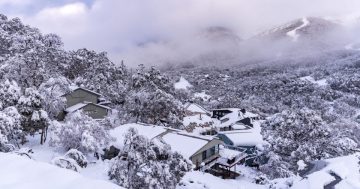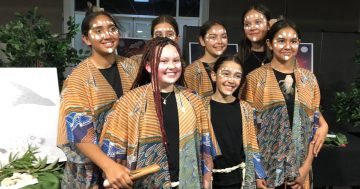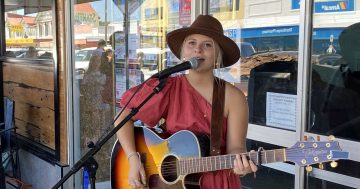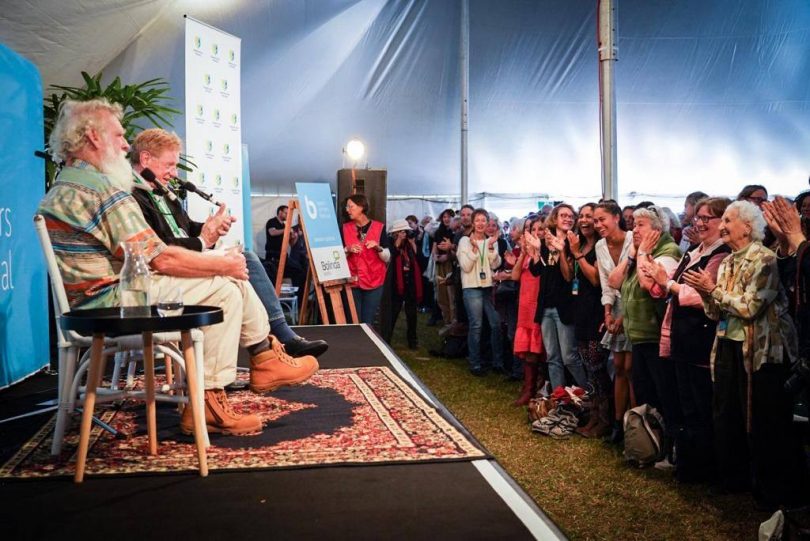
A standing ovation for Bruce Pascoe. Photo: Byron Bay Writers Festival Facebook.
I was lucky enough to have a few minutes alone with Bruce Pascoe before we flew from the Yuin Nation to the Bundjalung Nation where we would both be guests at the Byron Bay Writers Festival. Sitting in the makeshift terminal at Merimbula, Bruce told me how pleased he was to hear that Indigenous author Melissa Lucashenko had just won the Miles Franklin for her novel ‘Too Much Lip’. I had to admit I had not read the book.
“It’s hard to find enough time to read,” I said.
Bruce nodded. “What do you do?” he asked. “Other than writing?”
“I’m always on the hustle,” I said, listing off my casual employments. “I’m a writer but I can’t give up the day jobs yet.”
“Yeah!” Bruce smiled. “Get a job! That’s the first thing I tell people when they want to become a writer.”
We journeyed onward and each time our paths crossed we shared a smile, a nod. Bruce’s wild white beard and casual attire mark him out as something of a character at these events. Do you know Bruce Pascoe? I was asked, many times. He’s from down your way. Never mind the fact that Bruce is 100km south of me, in an entirely different state.
I made a point of attending Bruce’s festival session on the Saturday afternoon. He was to be in conversation with Kerry O’Brien and I was keen to learn more about this feller who comes from down my way.
The Writers Festival at Byron is a beautiful thing. It’s located on the grasslands adjacent to North Belongil Beach. There’s a pop-up book store, market stalls, wine tasting, plenty of coffee and thousands of patrons strolling the grounds dipping in and out of conversations with writers. Massive open-air tents play host to these conversations and when I arrived at Bruce’s tent, the place was packed. I found a patch of grass and – as the sun began to sink – relaxed into the familiar tones of Kerry O’Brien ably introducing me to this insightful man.
Bruce is a writer from Gypsy Point, Victoria. He has Bunuron, Tasmanian and Yuin heritage and his latest book is for children: Young Dark Emu – A Truer History. It’s an adaptation of his earlier book, Dark Emu, written for adults.
Kerry began by asking Bruce why he felt it was racist to describe Indigenous people as having been nomadic hunter-gatherers. Bruce answered at length, explaining that when white settlers arrived, there was evidence – recorded in the notes, drawings and observations of those white colonists – that demonstrate Aboriginal people were living in ways that shaped and farmed the land sustainably. He cited records that showed Aboriginal people built villages, cultivated crops, dug dams, utilised fire and had developed complex aquaculture systems.
“They hunted,” he said. “They gathered. But they were more than this.”
Bruce explained that 120 000 years ago Indigenous Australians had well-thought out laws and governance systems.
“They had decided that everybody would have a house, everybody would have enough to eat, everybody would take part in the culture.”
At one point Kerry asked Bruce what he might say to former Reconciliation Minister Phillip Ruddock, who once suggested that Aboriginals were delayed in their cultural development because they hadn’t even invented the wheel.
“Well,” Bruce said, “I’d say G’day Phillip, because he’s probably a nice bloke.”
“He is,” Kerry assured him.
“Then I’d say, Phil’ here’s a wheel. Now – here’s a kangaroo. What are you gonna do with that wheel?”
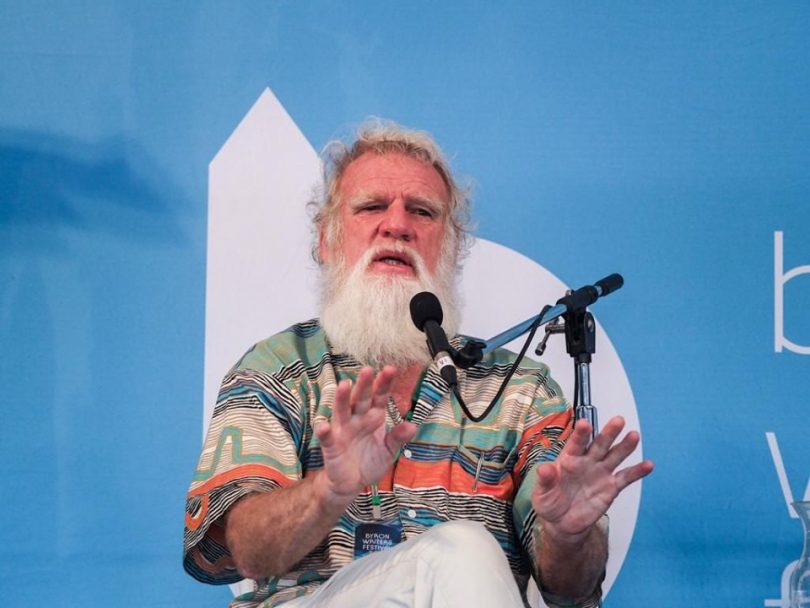
“We have to change things. We have to have the conversations with those that still don’t acknowledge and don’t understand” – Bruce Pascoe. Photo: Byron Bay Writers Festival Facebook.
After an uproar of laughter, Kerry steered the conversation to the future, asking what should be done now that we better understand Aboriginal culture and this “truer” history.
“If it just becomes an emotional response, that’s a failure,” Bruce said firmly.
“You’ve wasted your money, and I’ve wasted my time. We have to change things. We have to have the conversations with those that still don’t acknowledge and don’t understand. It could feel awkward,” Bruce said. “But if we just talk between ourselves nothing will change, we’ll just agree with one another.”
As Bruce was regaled with a standing ovation, I left the grassy edges of that tent a different person. Bruce has the capacity to shift something inside you – he inspires action. I flew back to this beautiful Yuin Nation ready to tell everyone that they must read Dark Emu. And that same night I started reading it myself. It’s a book I’ll make time for, despite my day jobs.
Words by Gabbie Stroud.
In 2014, Gabbie was a very dedicated teacher based in the Bega Valley with over a decade of experience. Months later, she resigned in frustration and despair.
In her powerful 2018 memoir ‘Teacher’, Gabbie tells that story; how she came to teaching, what makes a great teacher, what our kids need from their teachers, and what it was that finally broke her. Its a brilliant and heart-breaking memoir that cuts to the heart of a vital matter of national importance.
She has just completed her second book ‘A Letter to the Parents of Australia’. “The basic premise,” Gabbie explains, “is that parents need to do the work of a parent at home so teachers can do the work of a teacher at school.”
The book is due out in early 2020.
Gabbie was also a keynote speaker at the 2018 Festival of Open Minds in Bega, catch up on the discussion she led HERE.
Two years ago Bruce Pascoe had a similar impact in Moruya at the SAGE Harvest Festival, read Ian Campbell’s account of the day HERE.







